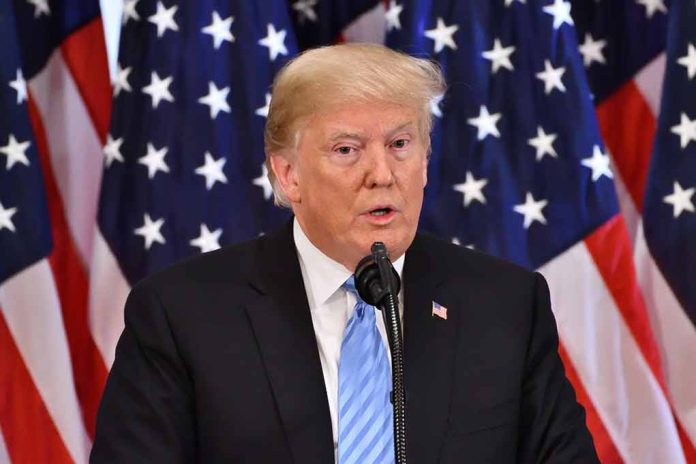
President Trump invokes emergency powers to combat the contraband crisis and illegal immigration, imposing tariffs on Canada, Mexico, and China.
Key Takeaways
- Trump signed an executive order imposing tariffs on goods from Canada, Mexico, and China to address contraband trafficking and illegal immigration.
- The order cites the International Emergency Economic Powers Act (IEEPA) and National Emergencies Act (NEA) as legal authorities.
- A 25% ad valorem tariff is imposed on Canadian products, with a lower 10% tariff on energy resources.
- Economists predict increased consumer prices for various goods due to these tariffs.
- The tariffs could potentially disrupt supply chains and jeopardize the United States-Mexico-Canada Agreement (USMCA).
Trump’s Executive Order: A Bold Move Against Drug Trafficking and Illegal Immigration
In a move aimed at easing escalating trade tensions, President Donald Trump announced a 30-day pause on tariff threats against Canada and Mexico on Monday. This decision came after the two nations made concessions to address U.S. concerns over border security and drug trafficking, including commitments to combat contraband smuggling and strengthen immigration control. The temporary suspension of tariffs, which had been feared to trigger a trade war and disrupt the global economy, gives the three countries a brief window to negotiate a more comprehensive agreement. However, with ongoing uncertainties around U.S. trade policies, particularly regarding China and the European Union, the global market remains on edge.
The executive order imposes a 25% ad valorem tariff on Canadian products, with a lower rate of 10% applied to energy resources. This differentiation aims to minimize potential disruptions in gasoline and home heating oil prices for American consumers. The tariffs are specifically designed to pressure these countries into taking more stringent measures to halt the flow of contraband and curb illegal immigration into the United States.
Economic Implications and Industry Concerns
While the administration touts this action as a necessary step to protect American citizens and national security, economists and industry leaders have raised concerns about potential economic repercussions. Many predict that these tariffs will lead to increased consumer prices across various sectors, as companies importing goods into the U.S. will likely pass on the additional costs to consumers.
“We need to protect Americans, and it is my duty as President to ensure the safety of all,” Trump stated, underscoring the administration’s commitment to national security.
Businesses, particularly in the homebuilding and alcohol production sectors, have warned of potential negative economic impacts. The automotive and construction industries, which rely heavily on cross-border trade, may face significant disruptions to their supply chains. Labor organizations, including the United Auto Workers union, have expressed apprehension about the tariffs’ impact on workers and industries.
Canada is facing a 25% tariff on its imports to the United States and 10% on its energy products. https://t.co/C4rJRnP4qV
— WBTV News (@WBTV_News) February 3, 2025
International Trade Relationships at Stake
The implementation of these tariffs could potentially jeopardize the United States-Mexico-Canada Agreement (USMCA), a trade pact that currently allows for tariff-free movement of products between the three countries. There are concerns that Canada and Mexico might retaliate, making U.S. products less competitive in those markets and potentially affecting U.S. exports.
“A Nation without borders is not a nation at all.” – Donald J. Trump
The U.S. auto industry and food supply chains are particularly vulnerable to these tariffs, with potential increases in vehicle and food prices looming. The Canadian lumber industry, already facing challenges, could be further impacted, potentially affecting U.S. home prices. Additionally, despite the lower tariff rate on energy resources, there are concerns about potential effects on gas prices, given that crude oil is a major Canadian export to the U.S.
Addressing the Contraband Crisis
The administration has cited the contraband crisis as a primary justification for these tariffs. However, it’s worth noting that recent data suggests the crisis may be improving. Overdose deaths have reportedly dropped by over 21% since June 2023, indicating that existing measures may be having a positive impact.
FOR IMMEDIATE RELEASE
02/01/25
Fact Sheet: President Donald J. Trump Imposes Tariffs on Imports from Canada, Mexico, and ChinaADDRESSING AN EMERGENCY SITUATION: The extraordinary threat posed by illegal aliens and drugs, including deadly fentanyl, constitutes a national…
— Sharyl Attkisson 🕵️♂️💼🥋 (@SharylAttkisson) February 2, 2025
The executive order emphasizes the need for immediate action to protect U.S. citizens and national security. It mandates regular consultation between U.S. officials to assess Canada’s cooperation in addressing the crisis and authorizes the Secretary of Homeland Security to implement the order and report to Congress.
As this situation continues to develop, it remains to be seen how these tariffs will impact international relations, trade dynamics, and most importantly, the ongoing efforts to combat drug trafficking and illegal immigration. The administration’s bold move underscores the complexity of these issues and the challenges in balancing national security concerns with economic stability.
Sources:
- Trump slaps tariffs on Canada, Mexico, China, risking higher prices for U.S. consumers
- Imposing Duties to Address the Flow of Illicit Drugs Across Our Northern Border – The White House
- Trump used fentanyl to justify tariffs, but the crisis was already easing
- Trump stretches trade law boundaries with Canada, Mexico, China tariffs | Reuters






